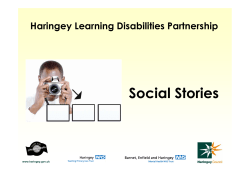
The new Mental Health Act Code of Practice
Author: Victoria Butler-Cole Organisation: 39 Essex Chambers Date of publication: 1 May 2015 Exclusively sponsored by: The new Mental Health Act Code of Practice The Mental Health Act 1983 Code of Practice was updated in April 2015. The Code is an important document which contains guidance for health and social care professionals working with people who have mental disorders or impairments. Where professionals are exercising powers under the Mental Health Act, they must follow what the Code says, or explain very clearly why they are not complying with it. The Care Quality Commission will monitor compliance with the Code, and individuals can bring legal proceedings to challenge a failure to follow the Code without good reason, so it has an important role to play in providing safeguards for people with mental disorders. The new Code is based on five key principles, which are of equal importance: Least restrictive option and maximising independence Where it is possible to treat a patient safely and lawfully without detaining them under the Act, the patient should not be detained. Wherever possible a patient’s independence should be encouraged and supported with a focus on promoting recovery wherever possible. Empowerment and involvement Patients should be fully involved in decisions about care, support and treatment. The views of families, carers and others, if appropriate, should be fully considered when taking decisions. Where decisions are taken which are contradictory to views expressed, professionals should explain the reasons for this. Respect and dignity Patients, their families and carers should be treated with respect and dignity and listened to by professionals. Purpose and effectiveness Decisions about care and treatment should be appropriate to the patient, with clear therapeutic aims, promote recovery and should be performed to current national guidelines and/or current, available best practice guidelines. Copyright: When reproducing this document, you must fully acknowledge the author of the document as shown at the top of the page. Please see Network Autism Terms and Conditions for details. Author: Victoria Butler-Cole Organisation: 39 Essex Chambers Date of publication: 1 May 2015 Efficiency and equity Providers, commissioners and other relevant organisations should work together to ensure that the quality of commissioning and provision of mental healthcare services are of high quality and are given equal priority to physical health and social care services. All relevant services should work together to facilitate timely, safe and supportive discharge from detention. Autistic spectrum disorders are viewed as mental disorders under the Mental Health Act. The new Code recognises, however, that autism (and learning disabilities) are not like the serious mental illnesses that are the most common reason for using the Act, not least because they cannot be ‘treated’ like those illnesses. This means that although people with autistic spectrum disorders may meet the criteria to be detained in hospital under the Act, it will be very rare that someone is not also displaying abnormally aggressive or seriously irresponsible behaviour. The new Code makes clear that detaining a person with autism in hospital is rarely likely to be helpful, since it will inevitably involve changes in routine that will provoke anxiety. Inappropriate care could then make challenging behaviour worse, leading to a negative cycle resulting in everincreasing restrictions on liberty. The new Code states that: ‘Hospitals are not homes, and most support for people with ... autism should be provided in a local community setting.’ The new Code is also very clear about the need to make sure that people are not detained just because there is no available treatment or care in the community. There is a strong emphasis on avoiding detention wherever possible. If detention is required, the new Code says that people with autism should be detained: ‘for as short a period as possible.’ The Code gives some helpful guidance about how to care appropriately for someone with autism, including: Support with communication Allowing sufficient time for the person and any others supporting them for preparation before meetings Giving people accessible information explaining rights and how to raise safeguarding concerns or complaints Providing treatment goals and support plans in an accessible format Offering adapted treatment programmes including psychological therapies Providing an adapted therapeutic environment Ensuring that meetings are held in an environment which is not intimidating Copyright: When reproducing this document, you must fully acknowledge the author of the document as shown at the top of the page. Please see Network Autism Terms and Conditions for details. Author: Victoria Butler-Cole Organisation: 39 Essex Chambers Date of publication: 1 May 2015 Carrying out risk assessments of personal safety (due to increased vulnerability) Allowing prioritised access to and involvement of carers and/or advocates, unless the individual had indicated that they do not want this. The new Code contains a more nuanced approach to challenging behaviour, recognising that there can be many reasons why such behaviour occurs, and that it should not be assumed that such behaviour is an inevitable part of having an autistic spectrum disorder. The Code gives examples: Inconsistent care A lack of clear communication with patients The excessive or unreasonable application of rules and demands Restricted or unpredictable access to preferred items and activities. Applying the new Code’s guidance should mean that professionals take a holistic view of challenging behaviour and focus on exploring external triggers for the behaviour which could be removed or reduced, as well as on understanding historical experiences that may explain why a person exhibits challenging behaviour. The new Code also places a greater emphasis on the role of family members and carers, who are likely to have important and useful knowledge which can be shared with professionals. Under the new Code, hospitals should not have blanket policies, but should be responsive to the particular needs and circumstances of individuals. For example, there should no longer be general policies about visits to hospital, such as rules that there will be no visitors for a set period of time after admission. The new Code explains the overlap between the Mental Health Act and the Mental Capacity Act deprivation of liberty safeguards. A person who lacks capacity to consent to admission to hospital but is not objecting to admission could potentially be detained under either Act. A decision should be made in each case about which Act should be used. Some patients and their families may prefer admission under the Mental Health Act, which could lead to free aftercare services. Others may wish to rely on the Mental Capacity Act and to be able to challenge decisions in the Court of Protection. People with autistic spectrum disorders, their families, carers and advocates, should be aware of the new Code and should find it helpful in avoiding detention under the Mental Health Act, and in protecting the patient’s rights if detention is authorised, as well as in relation to the care and treatment of people with autistic spectrum disorders generally. Read the new Mental Health Act Code of Practice Copyright: When reproducing this document, you must fully acknowledge the author of the document as shown at the top of the page. Please see Network Autism Terms and Conditions for details.
© Copyright 2025









